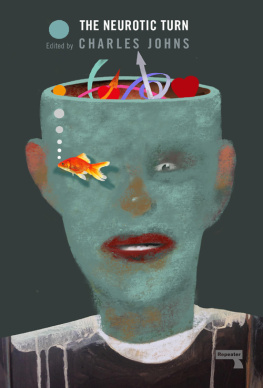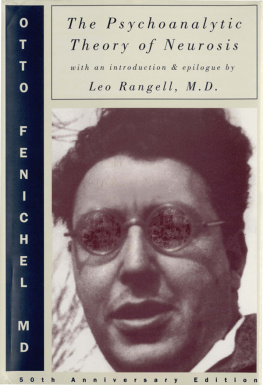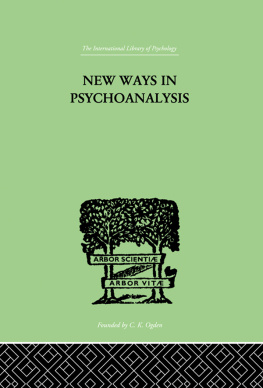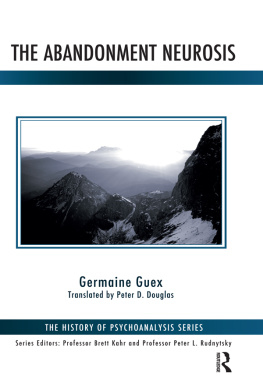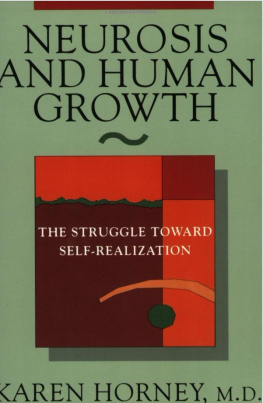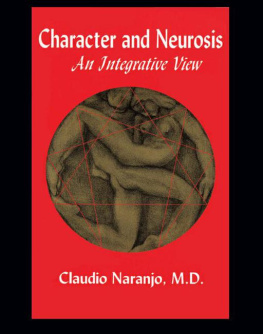THE NEUROTIC TURN
THE NEUROTIC TURN
Inter-Disciplinary
Correspondences on Neurosis
Edited by Charles William Johns
Contents
Neurosis can still be your comforting friend:
Neurosis and Maladjustment in Twentieth- Century Medical and Intellectual History
Anthroponotic Neurosis: Interspecies Conflict in
Clinical Animal Studies
Introduction
Charles William Johns
The Neurotic Turn lays claim to a turn not dissimilar from those other turns with which we have become familiar the linguistic turn and, more recently, the speculative turn. However, in this instance, the neurotic turn may not have come about intentionally, but rather as a symptom that, once repressed through the aegis of clinical psychiatry, the social sciences, materialist philosophy, etc., has come gushing forth, expecting its patients to be answerable to the phenomenon. This book started as some kind of pandemic, receiving an influx of passionate, polemical proposals (over twice the amount compiled here) from victims throughout the world (spanning from Iran, Finland, France and America, to England, Egypt and China). It seems that there was no shortage of reasons why neurosis, and intellectuals working on neurosis, proliferated and disseminated itself upon that mutable map we call Western culture.
There comes to my mind three immediate reasons why this would be the case. One is concerning psychology, the other is concerning philosophy, and the last is concerning capitalism (if I may use such a broad term).
It should come as no surprise, then, that this book has been organised into corresponding sub-headings: Psychology, Philosophy and Capitalism (as well as a highly enjoyable section on Linguistics).
Concerning psychology then, we need only point to the polemics of our very own contributors. Petteri Pietikainen convincingly shows us that the category of neurosis was never discarded because of its apparent obsoleteness (as the DSM confidently expresses) but instead was politically sidelined due to its obscurity; the ever-growing technological era of the twentieth century could not calculate nor locate what appeared as an increasingly useless nervous condition. The prevailing widespread manufacturing and use of pharmaceutical drugs did not seem to get rid of the problem, and the growing idealization at the time of man as a healthy, working cog in the capitalist machine seemed to be at odds with not only the ambiguity of neurosis but also its neurotic patients, who showed no signs of gleeful participation with the modes of production and cultural values at the time.
John ODonoghue gives us another great insight. It is not, like for Pietikainen, that neurosis was deemed too obscure for an overly positivistic society, but that it was too pertinent. ODonoghue reminds us of those initial constructions of neurosis in Freuds Beyond the Pleasure Principle. We soon realize that Freuds theory of inhibition and excitation, the unique balance between anal retention/defence mechanism/deferral (Death/Thanatos) and the excess of libidinal forces and wish fulfilment (Love/Eros) that makes us particularly human, is thoroughly consistent with both biological, cultural and empirical data and is found everywhere within present society, even consummated into products (the intricate gauging of the limits of alcohol, prostitution, the anal retention of organized work-time and leisure, etc.).
Dany Nobus cites Ivan Pavlovs contribution to animal psychology, stating that Pavlov not only paved the way for a non-anthropocentric, a-social characterization of neurosis, but also showed that the sources of stress and pain that caused neurosis in animals could also be seen as relatively independent from the socio-cultural milieu that instantiated the definition. What appears interesting, in retrospect, is that the non-organic (some might say semiotic) associations between stimulus and response (the ringing of a bell associated with food for example) found in Pavlovs dogs, and the associationism found in traditional human psychology, are of the same kind.
Our final essay in this section, by Sean McGrath, beautifully foreshadows the following section on philosophy. McGrath speculates what a Schellingian psychotherapy would have looked like if it would have prevailed. The results are fascinatingly contemporary. For McGrath, dissociation is not described as a negative relation between the living subject and archetypal, unconscious or collective experience, nor some traumatic personal instance, but rather the phenomenological almost surface differences of consciousness itself.
Neurosis has had a long, dark history with the discipline of philosophy; it even precedes and spurs on those neurotic dialogues we have come to call philosophy. The neurotic vector within philosophy (and its philosophers) has been repressed and re-named rigour, discipline, duty, etc. It is only relatively recently in the history of philosophy that philosophers have thrown their hands up and given neurosis its due. Psychology was named queen of the sciences by Nietzsche and the path to the fundamental problems. Nietzsches perspectivism is precisely the disclosing of a neuroses of various perspectives, various inclinations, fighting over one another for their rite of place within history (or within the publication circuit). Nietzsches desire for all joys to return eternally, as well as the eternal return of the world that supplies such joy, can be seen as a naturalization of that repetition compulsion researched in Freud; of the remembering, repeating and working through of lived life. Gilles Deleuze (a great admirer of Nietzsche) went so far as to ontologize the processes of repetition (and the difference that ensued) that made up lived experience. In short, neurosis paved the way for thinking conditions of constitution, relative autonomy of thought, and the possibility and prescience of memory, all without recourse to transcendental forms (Plato), transcendental conditions (Kant), and all without tearing ourselves away from experience (contra scientific instrumentalism/scientific realism). Equally, within political philosophy, it too wouldnt take long for the thinker to equate thoughts auto-production with the processes of repetition found in society and its culture; technology, entertainment (film, the repetition of advertising images, the repetition of trends in fashion, etc.), means of production, etc. My contribution to this book is nothing short of an all-out attempt at describing every process whether of mind or of putative matter as neurotic. This is not without an ethical tone, however; we should be wary of those attempts at neurotic capture within our culture (the conformism of humans and their thoughts by humans and their thoughts), we should be wary of our own prejudices, values, and where they originally come from. Deep research into the history of ideas, their associations, and the mechanisms of seduction found in capitalism (but also our language) must ensue.
Graham Freestones contribution is refreshingly philosophical. What I mean by that is that it is not unaware of the perennial problems of Western philosophy, and it is not afraid of upholding both the skeptical position in terms of critiquing the apparent legitimacy of a physical reality nor is it afraid to think through the possibility of the unique autonomy of thought (seen in thinkers such as Descartes). Both these positions have become antiquated through the advent of phenomenology, materialism and modern science. Freestone discusses the irreducibility of thought to a physical site (a regional processor, as he calls it) and asks whether this irreducibility (and the agnostic disjunction that epistemologically ensues) does not uphold the notion that concepts have their own competing autonomous agencies that plug themselves into various minds
Next page
